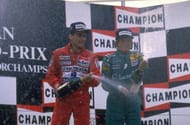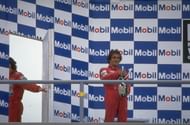There are F1 drivers who come, conquer and retire. Then there are those of the class of Ayrton Senna who grace the planet by virtue of an intense visitation.
From the onset of 1960 to 1994, the tumultuous world of Formula 1, it could be said, was fortunate to be visited by a man of sheer genius in Ayrton Senna.
Senna wasn't just any other racing driver.
He actually knew what it meant to be on the edge, to push the limits, and to catapult the sport to a level from which there'd be nothing else but levitation.
As the film based on his life, Senna reaffirms the notion, there was indeed an energy about Senna that few others brought to the sport. His drives at Donnington Park, Estoril, Monaco, Suzuka weren't just races; they were what defines Grand Prix racing at the highest level.
Few drivers have been able to trespass the realm of their own statistical gathering. Senna was among a rare lot to which champions like Schumacher and Fangio belong.
But what made Ayrton Senna special?

The Brazilian was known to be a fearless and ruthless racing driver, who by virtue of his manic speed and massive talent reduced Grand Prix racing into often being a one-way street in which the checkered flag only anointed Senna as the man in charge.
He made legends like Alain Prost, Nigel Mansel, Emerson Fittipaldi look ordinary on most days. It wasn't that their racing craft was devoid of the talent to embrace a highly unpredictable sport's twists and trepidations. It was just that Senna's graph was far beyond the reach of many.
And maybe that is why, despite being a man of flesh and bones; being this sort of flawed mortal, who ascribed to the thinking of being born with a birthright to win, once behind a Formula 1 car, Senna seemed an immortal who was driven beyond comprehensible limits to win.
Few drivers have attained as much by giving everything they had in pursuit of a race victory as Ayrton. It's this relentlessness that they produced at the highest levels in the world's most expensive sport that has etched their legend. Isn't it?
Having said that, maybe there's a sense in attributing all the adjectives of greatness to Senna owing to the fashion in which he'd seal his final ever triumph at the highest levels of Grand Prix racing, a win that would come at Adelaide in 1993, the then home of the Australian Grand Prix.
For starters, Ayrton Senna's 41st and thus, final race win of his F1 career is so highly regarded because it was to be a win that came against all odds.
To be fair to the multiple world champion, on November 7, 1993, sparks flew at the Adelaide Street Circuit but only because the explosive McLaren of Senna- the legendary MP4/8 (Ford Cosworth V8) seemed determined to seal the fate of others running in contention for the top spot of the podium; Damon Hill, Alain Prost, Michael Schumacher.
The exuberance of Ayrton
That said, what made Senna's win at Adelaide a sensational triumph and clearly among his more famous wins is the suddenness with which he usurped the stronger looking Williams of opponents Damon Hill and Alain Prost, who had looked solid during qualifying to clinch pole.
But instead of the Frank Williams' stunner, it would be the surprisingly ballsy McLaren, commanded by Senna and guided by Ron Dennis that clinched pole, a facet that would go down into history books as being his 65th career pole, a huge tally during that time.
As the grid prepared to battle among themselves on race-day, Senna would be the man to beat and was the essential target especially for the likes of the twin Williams' of Alain Prost and Damon Hill, who followed the McLaren driver in second and third places, respectively.
Wrong call by McLaren?
Following the two Willaims cars would be Benetton Ford of newbie Michael Schumacher, with the German being trailed by Senna's then-teammate, Mika Hakkinen.
It took two aborted starts for live action to begin and immediately, within seconds of the five red lights turning green, one saw Senna and Prost engage in a quintessential battle down Turn 1 wherein the Brazilian defended his lead.
A race that should've panned out as a fierce contest not only between the toughest cars at the front- McLaren and Williams- but also as a strategic battle between the two teams was made nervy and complex only because of an erroneous call made by Senna's McLaren crew.
In attempting to box following Prost's strategy, when McLaren ordered Senna to dive into the pits, during Lap 23, they got to know it wasn't Prost who they'd followed, but his English teammate, Damon Hill.
Drama in the middle stages
In clocking the wrong Williams, Senna, who could've panicked especially because he never had a race-strategy forged prior to the start of the race, did anything but that. He came even harder at the Williams duo and went on to display the quintessential nerves of steel he was famous for being.
Soon, starting Lap 24, in what seemed a large gap to fill at the front, instead of going all ballistic on team radio, Senna thought of the idea of blasting his team as futile and that he had to launch an all-out attack on Prost, if he had to win, considering he was the pole-sitter, not the 'Professor.'
While Hill had already stopped, Prost, pitted for fresh rubber on Lap 28. During this time, Senna gave everything he could to keep off an attacking Prost, now diminishing the gap to the McLaren, holding the track position.
Despite carrying heavier fuel load amid constantly increasing track temperatures, Senna was hardly disgruntled or threatened.
As the race continued with only a few laps to go, the battle between the men responsible for setting the fastest laps saw Senna and Prost constantly engaged in a tiff.
Then, finally, with only nine laps to go, catching his Williams teammate Alain Prost, Damon Hill made a mess of his chances at the Brabham Straight. It wasn't hard to recognize that pressure had got the better of him.
The increasing pressure at the end

This left the race into being essentially a contest between two long-standing rivals of the sport: Senna and Prost, a dynamic duo whose explosive on-track battles had catapulted F1 in the 80s and 90s to the attention of the world.
With Prost gaining every passing lap on Senna, the latter's task of fending off the Frenchman became increasingly tense. Not that Senna jumped the gun. In the end, he took the checkered flag and crossed the victory line for one last time, and in the process, managed to score a 'new fastest lap' record, going at a menacing 1:15:381.
There are things that other drivers could pull off with immense grit. And there were instances such as the win at Adelaide in 1993 that only a driver as steely as Aryton could've pulled off.
Latest F1 News, Calendar, Standings, Results, Records and more at Sportskeeda
